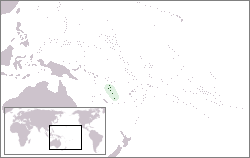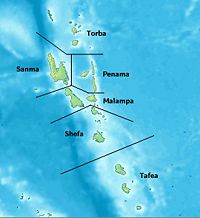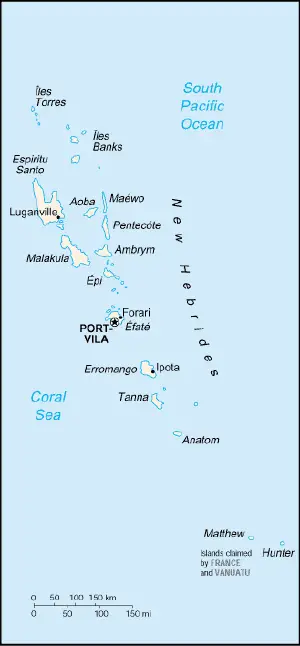Vanuatu
| Ripablik blong Vanuatu (Bislama)
République de Vanuatu (French) Republic of Vanuatu |
||||||
|---|---|---|---|---|---|---|
|
||||||
| Motto: "Long God yumi stanap" (Bislama)
(In God we stand[1][2][3]) |
||||||
| Anthem: "Yumi, Yumi, Yumi" (Bislama)
("We, We, We") |
||||||
| Capital (and largest city) | Port Vila 17°45′S 168°18′E | |||||
| Official languages | Bislama, English, French | |||||
| Demonym | Ni-Vanuatu; Vanuatuan | |||||
| Government | Parliamentary republic | |||||
| - | President | Iolu Abil | ||||
| - | Prime Minister | Sato Kilman | ||||
| Independence | from France and the United Kingdom | |||||
| - | Date | 30 July 1980 | ||||
| Area | ||||||
| - | Total | 12,190 km² (161st) Template:Convert/LoffAoffDoutput number onlySoff sq mi |
||||
| Population | ||||||
| - | estimate | 224,564 (July 2011 est.)[4] | ||||
| - | 2009 census | 243,304[5] | ||||
| - | Density | 19.7/km² (188th) 51/sq mi |
||||
| GDP (PPP) | 2010 estimate | |||||
| - | Total | $1.216 billion[6] | ||||
| - | Per capita | $5,500 (2010 est.)[6] | ||||
| GDP (nominal) | 2010 estimate | |||||
| - | Total | $721 million[6] | ||||
| - | Per capita | $2,835[6] | ||||
| Currency | Vanuatu vatu (VUV) |
|||||
| Time zone | VUT (Vanuatu Time) (UTC+11) | |||||
| Internet TLD | .vu | |||||
| Calling code | +678 | |||||
Vanuatu, officially the Republic of Vanuatu, is a Melanesian island nation located in the South Pacific Ocean. The archipelago is located some 1,090 miles (1,750 kilometers) east of Australia, 310 miles (500 kilometers) northeast of New Caledonia, west of Fiji and south of the Solomon Islands. Vanuatu was the location of a unique Anglo-French government system, it operates as a tax haven, and it is home to a messianic cargo cult that continues as a political party. The cargo cults believe that manufactured western goods (cargo) have been created by ancestral spirits and intended for Melanesian people. The earliest was the Tuka Movement that began in Fiji in 1885. The classic period of cargo cult activity, however, was in the years during and after the Second World War. The vast amounts of war materiel that was airdropped into Pacific Ocean islands during the campaign against the Japanese necessarily meant drastic changes to the lifestyle of the islanders.
Geography
Vanuatu is an archipelago of 83 islands, two of which—Matthew and Hunter Islands—are also claimed by New Caledonia. Of all the 83 islands, 14 have areas larger than 40 square miles (100 square kilometers). They are, from largest to smallest: Espiritu Santo, Malakula, Éfaté, Erromango, Ambrym, Tanna, Pentecôte, Épi, Ambae or Aoba, Vanua Lava, Santa Maria, Maéwo, Malo Island, and Anatom or Aneityum.
Most of the islands are mountainous and of volcanic origin, and have a tropical or sub-tropical climate. The nation's largest towns are the capital Port Vila, on Éfaté, and Luganville, on Espiritu Santo. The highest point in Vanuatu is Mount Tabwemasana, at 6158 feet (1,879 meters), on the island of Espiritu Santo. Volcanic activity is common with an ever-present danger of a major eruption; there are several active volcanoes, including Lopevi, a small uninhabited island, and several underwater ones. The most recent major eruption occurred in 1945. Tsunamis are another potential natural hazard.
The climate is tropical, moderated by southeast trade winds from May to October, with moderate rainfall from November to April. Rainfall averages about 94 inches yearly (2,360 millimeters), but can be as high as 160 inches yearly (4,000 millimeters) in the northern islands. Annual rainfall may be affected by cyclones from December to April.
Vanuatu is recognized as a distinct terrestrial ecoregion, known as the Vanuatu rain forests, and is part of the Australasia ecozone that also includes New Caledonia and the Solomon Islands, as well as Australia, New Guinea, and New Zealand.
Natural resources include manganese, hardwood forests, and fish. Less than nine percent of land is regarded as arable. Most of the population does not have access to a reliable supply of potable water. Deforestation is an issue.
History
People speaking Austronesian languages first came to the islands of Vanuatu some 4000 years ago. In 1605, the Portuguese explorer Pedro Fernández de Quirós became the first European to reach the islands, believing it to be part of Terra Australis. Europeans began moving to the islands in the late eighteenth century, after British explorer James Cook visited there on his second voyage, from 1772-1775, and named them New Hebrides.
Vanuatu suffered from the practice of "black birding," wherein half of the adult male population of some islands became indentured workers in Australia. Around that time, Catholic and Protestant missionaries arrived, as did settlers, looking to establish cotton plantations, then coffee, cocoa, banana, and, most successfully, coconut plantations. A French-British naval commission was established to administer the islands in 1887. In 1906 the French and British agreed to an Anglo-French Condominium, a unique form of government, with separate governmental systems that came together only in a joint court. Melanesians were barred from acquiring the citizenship of either power.
Self-governance
In the 1960s, the ni-Vanuatu people started to press for self-governance and later independence. The first political party was established in the early 1970s and was called the New Hebrides National Party. One of the founders was Father Walter Lini, who later became prime minister. Renamed the Vanua'aku Party in 1974, the party pushed for independence. In 1980, the Republic of Vanuatu was created. It joined the United Nations in 1981, and the Non-Aligned Movement in 1983.
During the 1990s, Vanuatu experienced political instability, which resulted in a more decentralized government. The Vanuatu Mobile Force, a paramilitary group, attempted a coup in 1996, because of a pay dispute. There were allegations of corruption in the government of Carlot Korman in the early 1990s.
Politics
Vanuatu has a republican political system headed by a president, who has primarily ceremonial powers and is elected by a two-thirds majority in an electoral college consisting of members of Parliament and the presidents of Regional Councils. The president serves a five-year term. The president may be removed by the electoral college for gross misconduct or incapacity. The prime minister, who is the head of government, is elected by a majority vote of the Parliament. The prime minister appoints the Council of Ministers, thus forming the executive. The Parliament of Vanuatu is unicameral, and has 52 members; these are elected every four years by popular vote, unless dissolved earlier. The National Council of Chiefs, called the "Malvatu Mauri," advises the government on matters concerning Ni-Vanuatu culture and language. Since 1994, Vanuatu has been divided into six provinces: Malampa, Penama, Sanma, Shefa, Tafea, and Torba.
Government and society in Vanuatu tend to divide along linguistic—French and English—lines. Forming coalition governments, however, has proved problematic at times, owing to differences between English language and French language speakers.
The legal system of Vanuatu is based on British law. The Supreme Court consists of a chief justice and up to three other judges. Two or more members of this court may constitute a Court of Appeals. Magistrate courts handle most routine legal matters. The constitution also provides for the establishment of village or island courts presided over by chiefs to deal with questions of customary law.
Vanuatu has joined the Asian Development Bank, the World Bank, the International Monetary Fund, and the Agence de Cooperation Culturelle et Technique. Since 1980, Australia, the United Kingdom, France, and New Zealand have provided the bulk of Vanuatu's development aid. Vanuatu retains strong economic and cultural ties to Australia, New Zealand, and France. Australia now provides the most external assistance, including to the police force, which has a paramilitary wing.
Economy
The Vanuatuan economy is based primarily on subsistence or small-scale agriculture, which provides a living for 65 percent of the population. Fishing, offshore financial services, and tourism (with about 50,000 visitors in 1997), are other mainstays. Mineral deposits are negligible; the country has no known petroleum deposits. A small light industry sector caters to the local market. Tax revenues come mainly from import duties and a 12.5 percent tax on goods and services.
Economic development is hindered by dependence on relatively few commodity exports, vulnerability to natural disasters, and long distances from main markets and between constituent islands. A severe earthquake in November 1999, followed by a tsunami, caused extensive damage to the northern island of Pentecote, leaving thousands homeless. Another powerful earthquake in January 2002 damaged the capital, Port-Vila, and surrounding areas, and was also followed by a tsunami.
In response to foreign concerns, the government has promised to tighten regulation of its offshore financial center. In mid-2002, the government stepped up efforts to boost tourism.
Vanuatu is a tax haven that does not release account information. The Vanuatu government is being pressured to adhere to international norms. In Vanuatu, there is no income tax, no withholding tax, no capital gains tax, no inheritance taxes, and no exchange controls. Many large companies have chosen to incorporate in Vanuatu to avoid regulation and legal challenges.
Exports totaled US$205 million in 2004. Export commodities were copra (dried coconut meat), beef, cocoa, timber, kava, and coffee. Export partners were Thailand (46.1 percent), Malaysia (19.1 percent), Poland (8.1 percent), and Japan (7.6 percent). Imports totaled US$233 million. Import commodities included machinery and equipment, foodstuffs, and fuel. Import partners were Taiwan (20.2 percent), Australia (14.7 percent), Japan (13.5 percent), Singapore (11.9 percent), Poland (7.1 percent), New Zealand (5.6 percent), and Fiji (5.3 percent).
Vanuatu's per capita gross domestic product was just US$2,900.00 in 2003.
Demographics
Vanuatu had a population of 205,754 in 2005. Most of the population is rural, though Port Vila and Luganville have populations in the tens of thousands. Most of the inhabitants of Vanuatu (98.5 percent) are native Melanesian, or "Ni-Vanuatu," with the remainder made up of a mix of Europeans, Asians, and other Pacific islanders. A few of the islands are Polynesian outliers. About 2000 Ni-Vanuatu live and work in New Caledonia.
There are three official languages: English, French, and Bislama (a creole language which evolved from English). School children are taught both English and French. Business is conducted mainly in English, although there are many French companies that conduct their business in both French and English. Over one hundred local languages are spoken on the islands. The density of languages per capita is the highest of any nation in the world (with an average of only two thousand speakers per language); only Papua New Guinea comes close. All the indigenous languages are Austronesian languages.
Christianity is the predominant religion, represented by several denominations. A third of the population belongs to the Presbyterian Church, with the Roman Catholic and Anglican churches each claiming about 15 percent of the population. Others are the Seventh-day Adventist Church and the Church of Christ.
Culture
Vanuatu may be divided into three major cultural regions. In the north, wealth is established by how much one can give away. Pigs are considered a symbol of wealth. The central areas have Polynesian systems with hereditary chiefs, and a class system, complete with nobles and commoners. In the south, a system involving grants of title with associated privileges has developed. There, women hold low status.
Throughout the islands, life is characterized by a constant cycle of rituals. There are rituals for birth, for the achievement of status, for marriage, and for death. Mothers pay the uncles of boys to be circumcized—the boys are taken into the bush for weeks, where they have their foreskins removed and are introduced to the ways of manhood. From that point they no longer run naked, but wear a penis sheath.
With no written language, story telling, songs, and dances hold great importance. Art, from body decorations and tattoos to elaborate masks, hats, and carvings, is a vital part of ritual celebrations and the social life of the village.
The music of Vanuatu, as an industry, grew rapidly in the 1990s, and several bands have forged a distinctive Vanuatuan identity—especially bands like Huarere and Tropic Tempo, XX-Squad, and artists like Vanessa Quai. Traditional instruments are the "tamtam," an intricately carved drum created from a log, as well as panpipes, conch shells, and gongs.
The University of the South Pacific, an educational institution co-owned by twelve Pacific Island countries, has campuses in Port Vila and two other centers. The Vanuatu campus houses the university's only law school.
Cargo cults
During World War II, the islands of Éfaté and Espiritu Santo were used as allied military bases. Soldiers brought modern industrial goods, which prompted the development of several cargo cults. These are movements attempting to obtain industrial goods through magic and religion. The cargo cults believe that manufactured western goods (cargo) have been created by ancestral spirits and are intended for Melanesian people. White people, it is believed, have unfairly gained control of these objects. Cargo cults thus focus on overcoming what they perceive as undue "white" influences by conducting rituals similar to the white behavior they have observed, presuming that the ancestors will at last recognize their own and this activity will make cargo come.
The classic period of cargo cult activity, however, was in the years during and after the Second World War. The vast amounts of war matériel that were airdropped into these islands during the Pacific campaign against the Empire of Japan necessarily meant drastic changes to the lifestyle of the islanders. Manufactured clothing, canned food, tents, weapons and other useful goods arrived in vast quantities to equip soldiers—and also the islanders who were their guides and hosts.
By the end of the war the airbases were abandoned, and "cargo" was no longer being dropped. In attempts to get cargo to fall by parachute or land in planes or ships again, islanders imitated the same practices they had seen the soldiers, sailors and airmen use. They carved headphones from wood, and wore them while sitting in fabricated control towers. They waved the landing signals while standing on the runways. They lit signal fires and torches to light up runways and lighthouses.
One such cult revolved around the belief in a mythical messianic figure named John Frum (believed to be derived from "John from America"), promising Melanesian deliverance. John Frum continues as both a religious movement and a political party, with two members in Parliament in 2006.
Notes
- ↑ Selmen, Harrison (2011-07-17). Santo chiefs concerned over slow pace of development in Sanma. Vanuatu Daily Post. Retrieved 2011-08-29.
- ↑ John Lynch and Fa'afo Pat (eds), Proceedings of the first International Conference on Oceanic Linguistics, Australian National University, 1993, p. 319.
- ↑ G. W. Trompf, The Gospel is not Western: Black theologies from the Southwest Pacific, Orbis Books, 1987, p. 184.
- ↑ Error on call to template:cite web: Parameters url and title must be specifiedCentral Intelligence Agency. . The World Factbook.
- ↑ (2009)2009 Census Household Listing Counts.
- ↑ 6.0 6.1 6.2 6.3 Error on call to template:cite web: Parameters url and title must be specified. International Monetary Fund.
ReferencesISBN links support NWE through referral fees
- Vanuatu Tourism Office Retrieved July 10, 2007.
External links
All links retrieved May 3, 2023.
- “In pictures: Vanuatu volcano” – BBC News
| Countries and territories of Oceania | |
| Australia : Australia · Norfolk Island | |
| Melanesia : East Timor · Fiji · Maluku Islands & Western New Guinea (part of Indonesia) · New Caledonia · Papua New Guinea · Solomon Islands · Vanuatu | |
| Micronesia : Guam · Kiribati · Marshall Islands · Northern Mariana Islands · Federated States of Micronesia · Nauru · Palau · Wake Island | |
| Polynesia : American Samoa · Cook Islands · French Polynesia · Hawaii · New Zealand · Niue · Pitcairn Islands · Samoa · Tokelau · Tonga · Tuvalu · Wallis and Futuna | |
Credits
New World Encyclopedia writers and editors rewrote and completed the Wikipedia article in accordance with New World Encyclopedia standards. This article abides by terms of the Creative Commons CC-by-sa 3.0 License (CC-by-sa), which may be used and disseminated with proper attribution. Credit is due under the terms of this license that can reference both the New World Encyclopedia contributors and the selfless volunteer contributors of the Wikimedia Foundation. To cite this article click here for a list of acceptable citing formats.The history of earlier contributions by wikipedians is accessible to researchers here:
The history of this article since it was imported to New World Encyclopedia:
Note: Some restrictions may apply to use of individual images which are separately licensed.




